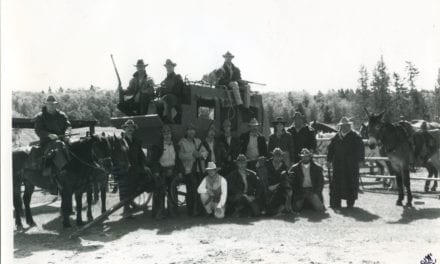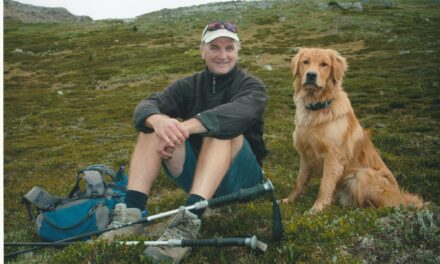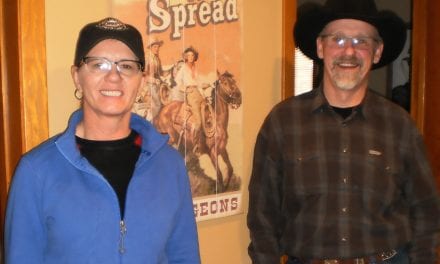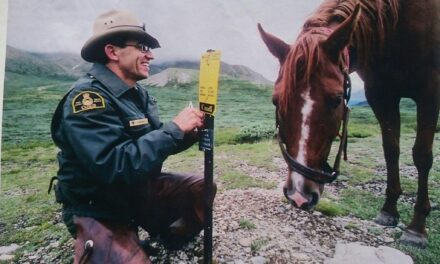And then in the cultural world, there was the protection and the park history, especially traditions in the Warden Service. And the esprit de corps of the warden service. I always tried to collect and preserve as much of that as I could. I started a file for just about every Warden whose name came up for something or other. I would create a file and throw in newspaper clippings or a historical story about somebody. And I started doing some oral history interviews too, with some of the older wardens that had retired. And many of them are no longer with us. I’ve told Marie Nylund (Warden Service Alumni Association) about it. And one of the things I need to do is go through the transcriptions, just to edit people names, place names, things like that, because they were transcribed by a company in Toronto called Transcription Heroes. And the person knew nothing about Jasper so place names or things like that need to be corrected. I’m working on doing that and getting them in to Marie. I had a really nice long interview many years ago with Mac Elder who recently passed away. Many of the people I interviewed were people that had worked in the Brazeau District or other sections of the backcountry where I have been, so we have a lot of things in common and I could ask a lot of questions that people who hadn’t been to those areas might not have thought of or have been able to talk about. I had some good conversations with Mac over the years.
Monique: (We had a chat about the oral histories that Mike did…I’d asked if he had interviewed Alfie Burstrom but he hadn’t. Mike mentioned that Vicki Wallace (who was married to Brian Wallace) did a bunch of oral histories long before Mike was in the Cultural Resource job and she was trying to do one with Alfie Burstrom but he wasn’t very keen. He was a very humble man. Maybe we should contact Vicki to see what interviews she has and add them to our project? We should also get Mike’s interviews added in – what do you think Marie?)The Jasper Yellowhead Archives has all of Vicki’s interviews. Best to contact them to see what has been done. archives@jaspermuseum.org – comment mike.
MH: Are there any legendary characters or stories associated with the Warden Service that you can share? Is there anyone from the Service that stands out in your mind?
MD: Well, some of the legendary people in my world were Willi Pfisterer. And there’s a great book that his daughter wrote called 50 Percent of Mountaineering is Uphill. You can just hear Willi’s voice at times in that book. I think a lot of the book was written from some of the interviews and recordings that she had done with him, so they were word for word, the way he spoke.
And Toni Klettl. I did an oral history with Toni. He was just finishing when I was just starting. But he was always around and I took him for a couple of drives through the park and he told me all about how things were different in the early days; where bridges were that you had no idea there was a bridge there or something that used to be a campground that is no longer a campground.
Todd McCready, I think an interview was done with Todd, but he was definitely a legend in his time around here. He was a helicopter pilot of the year, one year, just some incredible rescues and flying that he did as a helicopter pilot. You’d have to know some of his stories and get him to talk about them by leading him into them. (there was an interview done but he was being very humble so apparently not a lot was revealed)
Terry Winkler is a good friend of mine, so I have spent a lot of time with Max and Julie Winkler over the years. I listened to many of their stories of life in the Warden Service. And for me, Brian Wallace was kind of a real mentor and an enabler that was a big person in my career and helped me out a whole lot. Also somebody that’s coming up but he’s still working is Greg Horne. If that guy ever retires…and you do an oral history interview with him…you won’t believe the things that he’s done…from mountain climbing to just about everything else. The government is getting more than their money’s worth from that guy and besides that, he’s hilarious. Not just a hard worker but a pretty funny guy. He’s been around Jasper the whole time I’ve been here since 1984. But yeah, he’s done things like, recovered a broken ice axe, left during the first accent of Mount Alberta, by a team from Japan in 1925. And then found the other part of the ice axe, at the American Alpine Club Museum in New York City. He ended up putting the two parts of the ice axe together, the handle and the head, and then donated it to the Jasper Yellowhead Museum and Archives. On so many levels, he’s gone out of his way to do extra things. He does bat surveys, and he’s the caving person for Jasper. He goes caving five, six times a year in the park into caves that are so far back in the park that you have to fly to them. He’ll have a great oral history.
MH: Is there anything about the Warden Service, as you knew it, that you would like future generations to know?
MD: Well, the Warden Service has a really long history. 2009 was the centennial. Being a Warden, was much more than a job. It was a way of life and it was an identity as well. And when you’re in the Warden Service, it was kind of a subset of the Parks Canada world, but you were in kind of a unique little community that was spread across the country. And if you transferred from Jasper to Wood Buffalo or Gros Morne, you would know somebody out there from a course you’d taken or they had worked with you in another park or something like that. You always felt like there was a connection.
Besides just the Warden Service itself, there were the silent partners, and the not so silent partners, which was a group that started up in Jasper. They were the silent partners, but they decided that they didn’t like being called silent, because they were going to speak out. The fact that my wife, before she was my wife, and after, could come into the backcountry and help me out and even in more recent times, you’d get called out on something, and the “silent partner” would make sure you take some food and reminded you to grab a map or some extra clothing. They’re the ones that did a whole lot of the work that enabled the male Wardens, in the early days, to be able to do their job. You’ve heard the stories of selling fishing licenses and dealing with people that come to the station when the Wardens were away and all of that. So, I think that’s kind of unique. There’s a book by Anne Dixon called Silent Partners. I think new people to Parks, and Resource Conservation and the Warden Service should have a look at that book. Robbie Kaye’s book, Born to the Wild, it’s a good one to read. And Mike Schintz’s book, Close Calls on High Walls is another good one. He traveled around a bit, he went to Pukaskwa National Park and quite a few other parks. I also like to reread Frank Camp’s book from time to time, Roots in the Rockies. So folks that want to know how the Warden Service used to be, those are some of the good resources to look at. Also, Guardians of the Wild by Robert J. Burns and Backcountry as Home: Park Wardens, Families, and Jasper National Park’s District Cabin System, 1952-1972 by Nicole Eckert-Lyngstad (https://era.library.ualberta.ca/search?facets%5Ball_contributors_sim%5D%5B%5D=Eckert-Lyngstad%2C+Nicole+J are good historical documents on the Warden Service. And of course Sid Marty’s Men For The Mountains has a lot of warden history between the covers.
And in the Warden Service, too, I think when young folks started with the Warden Service there were always the older, wiser wardens around that were like the indigenous elders. They had the knowledge and the skills and, had been through a lot of the experiences and could give you some pretty good advice. In my early days, there were folks like Gord Anderson and Gord Antoniuk. Rod Wallace was a good mentor, as well. When I was in Elk Island, Jack Willman Chief Park Warden was great in that role. So there was that whole culture of mentorship and elders.
MH: What made the Warden Service such a unique organization?
MD: Shared experiences that made strong bonds among Wardens. Much like war veterans once you’ve been through a lot of things together, you have of a strong connection. You’ve been through a lot of different things, whether it was just backcountry horse trips, or rescues or courses. You would get on a lot of training at the Palisades in the early days, and sometimes at RCMP training depot in Regina or public safety schools. And so I’m sure a lot of that has changed now, just in that wardens today are a small group, and they do such a limited role in the park. Important, but smaller, much smaller. The Resource Conservation section in Parks Canada more closely resembles the old Warden Service than does the modern Wardens of today.
MH: Do you have any lasting memories as a Warden?
MD: Well, those family trips were some of my favorite memories. And I’ve just been pretty fortunate to have bosses that let me do those sorts of things. In the backcountry, my first string of horses, Julie, Frank, Erin, Zambia were always kind of special horses. Frank’s real name was Indigo, but he got named after I think Frank Staples because someone felt that he and Frank kind of acted the same. Other good horses that I had were Durango, Dillon, Boots and Duncan. In later years, Fiesta and Jack were some fun horses to have. Favorite cabins, Isaac Creek. I liked it because it was in the middle of a South boundary and just a beautiful location and Rocky Forks also in the Rocky District on the south boundary. Rocky Forks was beautiful location and kind of interesting, both of those cabins were built in the same year, I think it was 1923 and they were pretty well identical cabins. Did you ever hear the story about Rocky Forks almost getting blown up?
There is only one person who knows the true details, and we’re not sure if he’s telling all of the details. But there was a Warden back there, John Kellas, and he had some friends with him at Rocky Forks. And the story is that there was an old lantern that was lit and it started to make some noise and started rocking and…they thought that it was going to blow up. And so, I think folks dove and hit the floor, the lantern blew up. The explosion blew out the windows of the cabin. It lifted the roof and the logs of the cabin such that a map that was mounted on the wall became embedded between some of the logs when they came back down. Everybody managed to crawl out of the cabin and they were all safe. Maybe they had some hearing damage or something. And the thought was that maybe the lantern had been set on the woodstove that was lit. But I think John swears that no, it wasn’t on the woodstove or no the stove was not lit. But Rocky Forks survived that and it’s still there today. I think the entry in the logbook the next day starts off with “After some routine post explosion, cleanup….” So yeah, I don’t know if John is still around. He would be worth an interview.
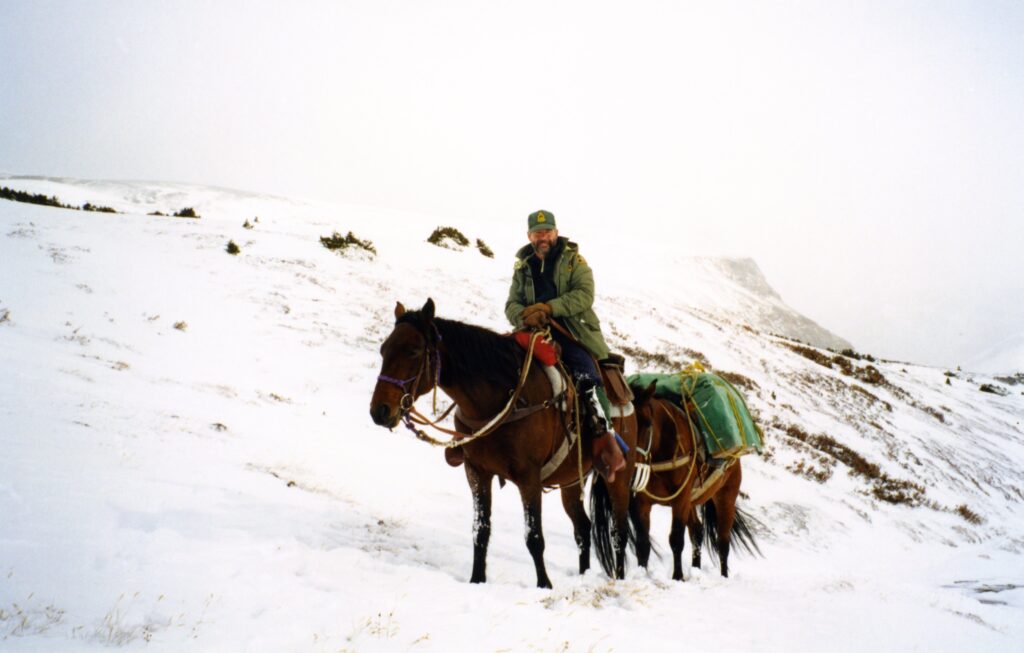
Mike Poboktan Pass October, 1992
MH: Do you ever miss being a Warden?
MD: Oh, yeah. Yes and no, you know, there were the good things, and I miss the fun stuff. I actually have a volunteer agreement with Parks and the first year after I retired, I did a clearing trip up to Athabasca Pass with Greg Horne and Dave Smith. Mike Eder took over my cultural position. He actually retired on November 23rd, 2022 a few days ago. He was in my old position for five years. I was always getting phone calls and emails from him looking for information and picking my brain for stuff. So I’m still involved in that sort of thing. And actually, even just the other day, my wife and I were going out to go dog walking. We’re out by the Sixth Bridge, the old Warden office area where the buildings aren’t there anymore. We had just had the first big snowstorm of the season. Anyways, in that field, by the weather station, we saw a loon’s head sticking up out of the snow. And that’s not the right place for a loon to be. So we called dispatch and told them about it because a loon has to be on water to be able to take off and fly.
It used to be an interview question in the early days of the Warden Service, like you find a grebe on a paved road and it can’t seem to fly, what’s the problem here? Again, with grebes, they have to be on water to take off. Anyways, we called dispatch. Ray Schmidt, from musical band “The Wardens” was the Resource Con person for the day, it was a Sunday. He ended up coming out he was by himself. So Joan, and I stuck around to help him catch this loon and then release it in the river. It’s amazing how fast a loon can travel in deep snow. But we managed to get ahead of it and kind of block it. Ray snuck up behind it and threw a blanket over it. We got it into a box and took it down to the river. There was ice flowing in the river, but it still had some open water. We put it in the river. It was a juvenile Common Loon. We released it in the river and it instantly goes underwater, and it’s underwater for a long time, and we’re going oh no, was it just on his last legs and now it’s drowning?
But then it popped up and it gave us one of its loon calls and it seemed like it was going to be okay, except all of a sudden a bald eagle appeared and it was starting to fly above the loon. But the best we could do was get it back into the water. So I am still kind of helping out now and then.
MH: Do you have any photos of yourself as a warden that you would like to donate? Artifacts?
MD: Yeah, I could send some things in. I looked at somebody’s oral history the other day, and they kind of nicely wove in some photos. Wait to get the transcript back and maybe do a little editing and I can pick out some appropriate photos.
MH: What year did you retire?
MD: 2017
